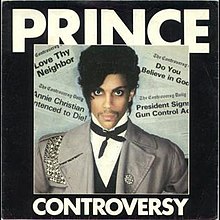Controversy (song)
| "Controversy" | ||||
|---|---|---|---|---|
 1981 UK 7" single | ||||
| Single by Prince | ||||
| from the album Controversy and The Hits 2 | ||||
| B-side |
| |||
| Released | September 2, 1981 (original US release) October 9, 1981 (original UK release) 1993 (Hits 2) March 29, 2004 (2004 release) | |||
| Recorded | Kiowa Trail home studio, late spring 1981 (Basic tracking) Sunset Sound, August 14-23, 1981 (Overdubs, mixing) (original) Hawaii, December 2003 (2004 release) | |||
| Genre | ||||
| Length |
| |||
| Label |
| |||
| Songwriter(s) | Prince | |||
| Producer(s) | Prince | |||
| Prince singles chronology | ||||
| ||||
| Prince (UK) singles chronology | ||||
| ||||
| Prince (1993) singles chronology | ||||
| ||||
| Prince (UK) (1993) singles chronology | ||||
| ||||
| Prince (2004) singles chronology | ||||
| ||||
"Controversy" is a song by American musician Prince, the lead single and title track to his 1981 album.[1] The song addresses speculation about Prince at the time such as his sexuality, gender, religion, and racial background, and how he could not understand the curiosity surrounding him.
Background
The song has two main verses, a few choruses, with the title repeated throughout the track. Towards the middle he recites the Lord's Prayer in full, which fueled the fire for some to say the song was blasphemous. Toward the end is a repeating chant of "People call me rude / I wish we all were nude / I wish there was no black and white / I wish there were no rules." The song features a steady 4/4 drumbeat, synthesized bass, guitar, and keyboards. The song was backed with "When You Were Mine", from his previous album, Dirty Mind.
In 1993, in support of The Hits/The B-Sides, "Controversy" was once again released in the UK as a single, this time as a two-disc EP containing several hits not on the collection. CD1 includes the edit of "Controversy", the William Orbit remix of "The Future", "Glam Slam", and "D.M.S.R.". CD2 includes the edit of "Controversy", "Anotherloverholenyohead", "Paisley Park", and "New Power Generation (Part II)". Like the "Peach" single, CD1 was a special foldout package with a place holder for CD2, which was sold separately. "Controversy" was also released on a 7" picture disc. It reached number 5 on the UK charts in December 1993.[2]
"Controversy" is considered Prince's breakthrough hit in Australia, where it peaked at number 15.[3] In the US, "Controversy" peaked at number 3 on the Black singles chart and number 70 on the Billboard Hot 100.[4] Also, along with the track, "Let's Work", "Controversy" was the first of seven number ones on the dance chart for Prince.[5]
Official versions
- "Controversy" (7 inch Edit) / (Single Version) - 3:39
- "Controversy" (Album Version) - 7:14
- "Controversy" (Live In Hawaii) - 6:06
Live in Hawaii
"Controversy (Live in Hawaii)" is a digital single made available for sale on Prince's website on March 29, 2004. The single consists of a live performance of the song: "Controversy", recorded on tour in Hawaii in 2003. The track also saw a limited release as a CD single, only available as part of a Prince in Hawaii Gift Box, available from Prince's retail outlet.
Samples
- The Jungle Brothers track "Black is Black", from their 1988 album Straight out the Jungle, features a sample of "Controversy".
Charts
| Chart (1981) | Peak position |
|---|---|
| Australian Singles Chart[3] | 15 |
| Dutch Singles Chart | 28 |
| US Billboard Hot 100 | 70 |
| US Billboard Hot Black Singles | 3 |
| US Billboard Hot Dance Club Songs | 1 |
References
- ^ "Prince - Controversy at Discogs". Discogs.com. Retrieved 2016-10-17.
- ^ "controversy | full Official Chart History | Official Charts Company". Officialcharts.com. Retrieved 2016-10-17.
- ^ a b Kent, David (1993). Australian Chart Book 1970–1992. St Ives, NSW: Australian Chart Book. ISBN 0-646-11917-6.
- ^ Whitburn, Joel (2004). Top R&B/Hip-Hop Singles: 1942-2004. Record Research. p. 471.
- ^ Whitburn, Joel (2004). Hot Dance/Disco: 1974-2003. Record Research. p. 357.
